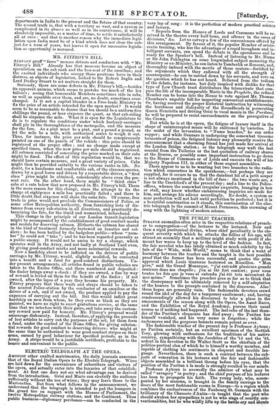MR. FITZROY'S BILL.
ALREADY gruff " fares" menace drivers and conductors with "Mr. Fitzroy's Bill." Already has that measure become an object of speculation on the cab rank and the box-seat of the omnibus ; and the exalted individuals who occupy those positions have in their distress, as objects of legislation, looked to Sir Robert Inglis and Lord Dudley Stuart to set matters straight for them.
Seriously, there are some defects in Mr. Fitzroy's bill,—besides its apparent animus, which seems to partake too much of the lex talioms ; seeing that honourable Members sometimes ride in cabs, as well as squabble over them, and are, no doubt, sometimes over- charged. Is it not a capital blunder in a Free-trade Ministry to fix the price of an article intended for the open market ? It would seem to be as reasonable to decree that tea should be a uniform five shillings the pound, or beer sixpence the quart, as that cab-riding ahall be sixpence the mile. What it is open for the Legislature to , do is to regulate the conditions under which hackney-carriages shall ply in the thoroughfares of the metropolis, and the measure for the fare. As a pint must be a pint, and a pound a pound, so let the mile be a mile, with authorized scales to weigh it out. ' Thus, for instance, the price per mile should be conspicuously painted on one of the panels of the vehicle : this price should be registered at the proper office ; and no change made except at specified times, when the new price per mile should be registered. All cabmen convicted of concealing the price marked on their cabs alight be fined. The effect of this regulation would be, that we should have certain measure, and a great variety of prices. Cabs might then be provided suitably to the various ranks in life. No doubt, for a handsome and comfortable cab, of the clarence species, drawn by a good horse and driven by a respectable driver, a "first class" price might be obtained, considerably above even the pre- sent rate. On the other hand, there might be "third class" cabs at a rate below that now proposed in Mr. Fitzroy's bill. There is the more reason for this change, since the attempt to fix the charge at eightpence a mile has practically failed ; and there is little doubt that sixpence will share the same fate. Of course, free trade in price would not preclude the Commissioners of Police, or some other Metropolitan authority, from furnishing lists of dis- tances from every cab-station in all directions, and practically de- termining the fare, for the timid and womankind, beforehand.
This change in the principle of our London transit-legislation • ht be accompanied by the establishment of good-conduct marks and medals for deserving cabmen. Hitherto the cabman has shared in the kind of treatment formerly bestowed on lunatics and sol- diers: he has been bullied by the badgeless public—whose " num- ber " he could not " take "; and he has been regarded generally as a public enemy. It would not be amiss to try a change, which operates well in the Army, and not badly at Scotland Yard even, by giving good-conduct marks and more substantial rewards. Now a hardship about to be inflicted on the drivers of public carriages by Mr. Fitzroy, would, slightly modified, be converted into a benefit and a fund for good-conduct distinctions. Un- der present arrangements, all articles found in public vehicles are taken to the Excise Office, and there numbered and deposited : the finder brings away a cheek: if they are owned, a fine by way of reward is levied on them for the benefit of the finder ; if not owned, after the lapse of a year they become his property. Mr. Fitzroy proposes that these waifs and strays should be taken to the nearest Police-station by the conductor of an omnibus or the driver of a cab, and if not owned, the produce applied to pay the expenses of carrying out the bill. But this would inflict great hardship on men from whom, be they even as black as they are painted, we have no right to exact gratuitous service, at the same time that we interfere with their gains, and take away the custom- ary reward now paid for honesty. Mr. Fitzroy's proposal would encourage dishonesty. Instead, therefore, of applying the proceeds of lost articles to carry out the purposes of the act, let them form a fund, under the control of the Home Office, for giving substan- tial rewards for good conduct to deserving drivers; who might at the same time be authorized to wear good-conduct stripes on their arms, earned by good behaviour for specified periods, as in the Army. A stripe would be a justifiable certificate, profitable to the bearer and convenient to the public.


























 Previous page
Previous page